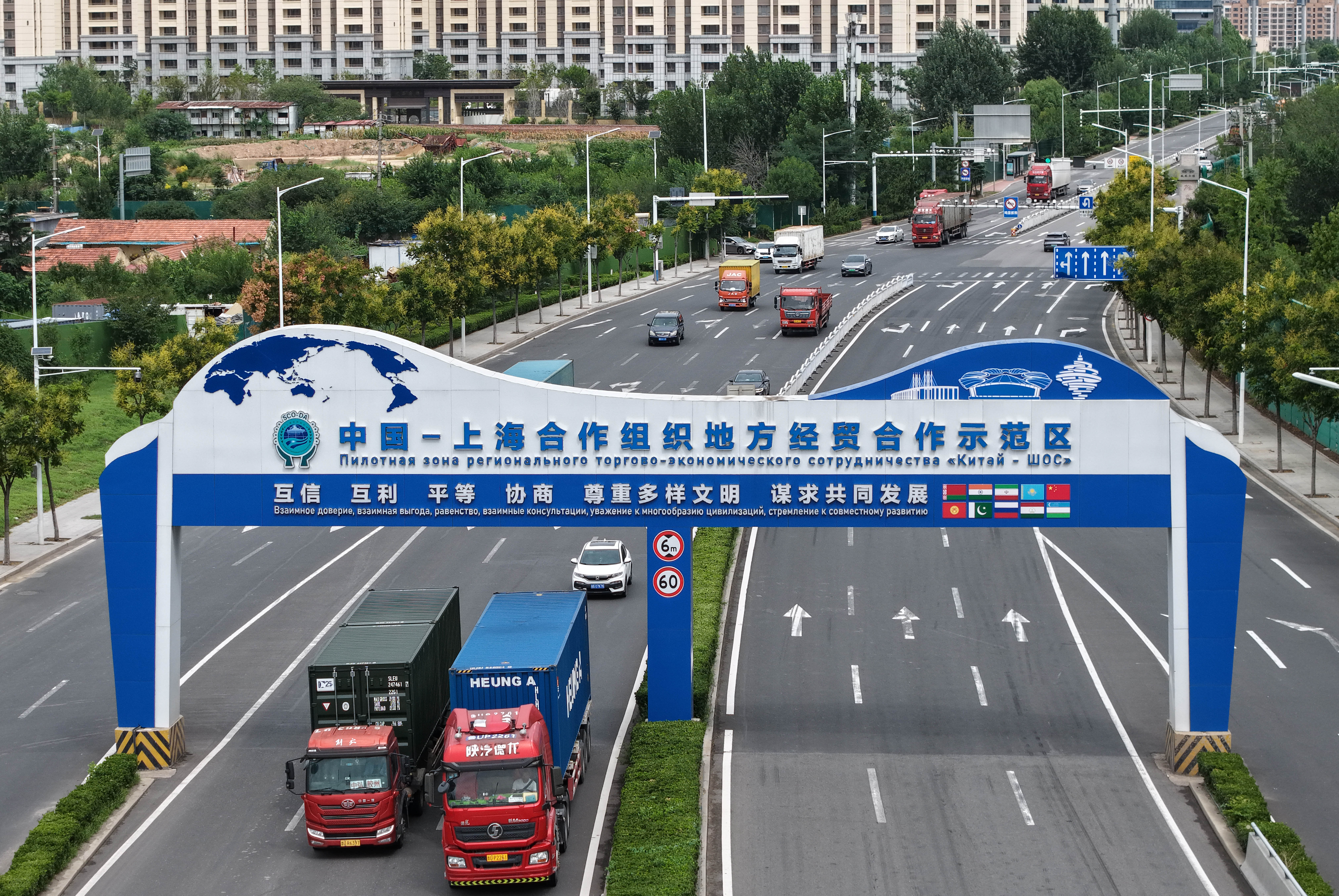SCO summit delivers real solutions for global peace and prosperity
来源:China.org.cn 2025-09-09 16:44
An aerial drone photo taken on Aug. 27, 2025 shows trucks transporting cargo on a road in the China-SCO (the Shanghai Cooperation Organization) Local Economic and Trade Cooperation Demonstration Area (SCODA) in Qingdao, east China's Shandong province. [Photo/Xinhua]
The largest Shanghai Cooperation Organization (SCO) summit concluded recently in Tianjin, China, attracting more than 20 world leaders. Since 2001, the grouping has expanded from its original six members into the globe's largest regional organization, covering dozens of cooperation areas with a combined economic output of nearly $30 trillion. The summit again proved the SCO's wide-ranging contributions to global peace and prosperity.
First, the summit saw China unveil the Global Governance Initiative, a new framework to strengthen participatory decision-making and bridge consensus-building gaps in an increasingly fragmented and polarized world. For instance, the principle of sovereign equality defeats the notion that one state could exercise absolute security at the expense of another, a fact that has become evident in key conflict hotspots, including the Middle East. China's principled pushback against the perils of hegemony, protectionism and rising threats to a multilateral world order found a compelling audience among the other heads of state – their nations united in recognizing the gaps in international governance.
The SCO's success in broadening its ranks to include states across various development stages offers evidence of that collaborative approach. Kazakhstan, Russia, Pakistan and Iran are among the states that have benefited from China's support for concessionary loans, flexible economic negotiations and future connectivity projects linking the Belt and Road Initiative with Eurasian infrastructure. The SCO's 2026-2035 development strategy serves as a strong endorsement of growth ambitions over the next decade, reflecting the organization's belief that long-term development visions can create shared progress across various sectors. The potential is sky-high: The SCO is expected to bolster cooperation across high-growth sectors spanning energy, artificial intelligence, green industry, sci-tech, and other major underpinnings of a fast-changing, rapidly evolving global market industry. Its track record of cross-sector engagement during global economic challenges positions it well to advance the multiyear development strategy.
The summit also expanded infrastructure development to address security concerns and counter collective threats. The announcement of four new SCO centers demonstrates this commitment, with facilities designed to counter narcotics, tackle transnational organized crime and strengthen information security cooperation. Add to them the new SCO development bank, and it's clear that the organization is looking to address gaps in the current international development framework by catering to the needs of the Global South and reducing constraints on lending, borrowing and infrastructure financing.
These institutional developments will help shape global stability. Considerable external pressures on national growth, limited access to capital, barriers to effective participation by less-developed states and differing views on resource distribution highlight gaps in current international development decision-making. The SCO Tianjin Summit appears to have gauged the situation well: It is developing action plans to accelerate high-quality development across smart industries and cutting-edge technological innovation. One of the strengths of this year's historic summit was its capacity to promote new cooperation mechanisms and centers on each of the agreed-upon engagement themes, raising optimism for deeper industrial cooperation, government and policy support, and a people-centric approach to future economic empowerment. China's plans to promote dozens of "small and beautiful" livelihood projects, expand human resource training, and provide over $280 million in grants to SCO states this year demonstrate that action plans must be backed by concrete commitments to drive meaningful progress.
Symbolically, the SCO gathering represents Eurasian unity at a time when conflict hotspots and diplomatic challenges hinder broad consensus-building. For instance, the U.N. Charter clearly recognizes the need for principled advancement of shared interests, but regional security organizations must follow through on those principles with concrete action. The SCO's success in building consensus among members from Iran to Belarus, from India to Russia, on genuine multilateralism demonstrates how to bring Global South interests to the forefront of policy discussions. At the SCO Plus Meeting, China underscored that the SCO's founding declaration and charter have always enshrined the core objective of fostering a more democratic, just and equitable international political and economic order. This founding vision, China noted, has been consistently upheld for 24 years through the organization's commitment to the Shanghai Spirit – a principle based on mutual trust, mutual benefit, equality, consultation, respect for diverse civilizations and common development.
Deeper realization within the SCO to avoid talk surrounding decoupling and revive the spirit of high-quality trade development sends a powerful message on genuine priorities. The SCO's decades-long track record shows that expanding membership and creating forums to coordinate development goals have been a consistent focus. These interests – in the face of some turbulent international pressures and trade schisms – leave the SCO well-positioned to become an engine of multilateral trading and robust supply chain advancement. With $30 trillion in combined economic heft, diverse exports, trade barrier elimination prerogatives, and alternative currency support, the SCO is providing stability amid international tensions that could disrupt existing frameworks.
The SCO's Tianjin Summit demonstrated that strong institutions, internal unity and coordinated sustainable development can create conditions for peace and prosperity among member states and a growing body of Global South supporters. The summit also achieved breakthroughs in the organization's structural reforms, including merging observer states and dialogue partners into SCO partners, and accepting Laos as a partner to make the SCO a 27-nation family.
This is what an enduring, inclusive and peaceful future should look like.
Hannan Hussain is co-founder and senior expert at Initiate Futures, an Islamabad-based policy think tank.






